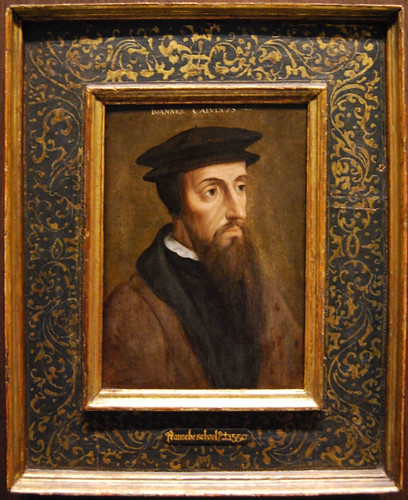John Harmar (also Harmer) was a Greek scholar, born at Newbury in Berkshire of unknown parentage. In 1569 he entered William de Wykeham’s School at Winchester. He also studied at St. Mary’s College, another College founded by William of Wykeham, whose motto was “Manners maketh the man.” In 1572 he became a scholar at New College, Oxford, matriculating in 1575. He graduated two years later, becoming a fellow in 1577.
Having come from a poor family he was blessed to receive the powerful patronage of Robert Dudley, Earl of Leicester, one of Queen Elizabeth's leading statesmen. This allowed him to study at Winchester and Oxford. He graduated MA in 1582.
Roberty Dudleyflickr.com
Robert Dudley,1st Earl of Leicester was especially interested in the furtherance of preaching, which was the main concern of moderate Puritans. He went to great lengths to support non-conforming preachers, while warning them against too radical positions which, he argued, would only endanger what reforms had been achieved. Dudley was patron of the Puritan movement, trying to mediate between them and the bishops.
Academic appointments.
From 1588 to 1696 he was headmaster of Winchester School. He was Warden of his College for seventeen years. - a post he held until his death.
In 1585 Harmar was appointed Regius professor of Greek at Oxford, holding the position for five years, from 1588 until 1595.
In 1604 he was appointed to the second Oxford group of scholars assigned to work on the translation for the English Bible of James VI and I. The group translated the gospels, Acts, and Revelation, . In recognition of this he was awarded a BD and DD in 1605.
He was installed as a prebendary at Winchester on 10 January 1595; he became rector of Compton, Hants the same year and of Droxford, Hampshire in 1596.
Publications
Harmar’s first published work was an English translation of Calvin's sermons on the ten commandments, which appeared in 1579 and 1581. He dedicated this translation to his patron Robert Dudley, Earl of Leicester. He accompanied the nobleman to Paris, where he held several debates with the popish Doctors of the Sorbonne. He stood high in the crowd of tall scholars, the literary giants of the time. (McClure)
The Sorbonne, Parisflickr.com
Harmar ‘s travels on the continent occurred some time before 1585. If he stayed at Geneva, as was probable, he would have attended Theodore Beza's lectures and sermons. He says he ‘found him [Beza] no lesse than a father unto me in curtesie & good will’ (Sermons, trans. Harmar, sig. 3r). He acknowledged this debt at Oxford in 1587 with an English translation of Beza's French sermons on the Song of Songs,.
Sir Henry Savile was a fellow Bible translator, and Harmar may have contributed to his important edition of the works of Chrysostom, printed at Eton in 1610–13. Harmar's will bequeathes a copy of this edition to Winchester College. Earlier in 1586 he was responsible for the first Greek book printed at Oxford. This was an edition of six sermons of John Chrysostom. In 1590 he used manuscripts at New College to produce the first edition of the Greek text of twenty-two of Chrysostom's sermons to the people of Antioch, and he supplied his own Latin version of the nineteenth sermon. (1)
Scholarship as a translator
When converting Beza’s French Sermons into English, Harmer showed his commitment to Calvinism, and his mastery of an excellent English style, as well as his adept skill in translating.
flickr.com
Wood described him as “a most noted Latinist, Grecian, and Divine.” A candidate for such distinction had to be well read in the Fathers and Schoolmen. In his earlier years he was accounted a very solid ‘theologist’ - ‘a subtle Aristotelian,' according to Wood (Ath. Oxon., 2.138). The scholastic writers had tried to apply Aristotle’s thought to Christian truths, as far as possible.
His attachment to and knowledge of Beza’s writings gave Harmar a natural sympathy and confidence in the latest Greek edition of the Received text of Scripture produced by Beza (1598). This position sought to make minor improvements to the previous editions of Stephens and Erasmus, and was the Greek text followed by the KJV Translators.
A member of the Revision Committee
Harmar is one of the few names we can be sure of, when describing the final revision team of twelve men. They worked on proposed amendments and resolutions of disagreements, deciding how the Text should be translated. The process was recorded by John Bois, for which see the relevant blog.
Final days
Harmar was married to Elizabeth, who survived him; they had no children. He did, however, make numerous bequests to relatives, friends, and dependents. He left many of his Greek books to New College and gave his collection of foreign-language bibles to Winchester College.
John Harmar was buried in the chapel of New College, where his epitaph was placed. His nephew John Harmar (1593/6–1670), also Regius professor of Greek at Oxford, promised Wood he would produce an account of his uncle's life for the Athenae, but this was never fulfilled. Harmar died on 11 October 1613. He was a considerable benefactor to the libraries both of the school and the college of Wykeham’s (1)
(1) P. Botley and N. G. Wilson National Dictionary of Biography
This is 21/52 Previous Next Index



